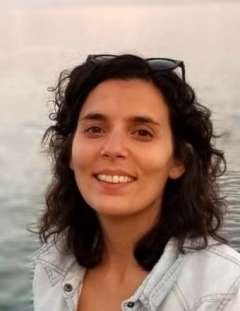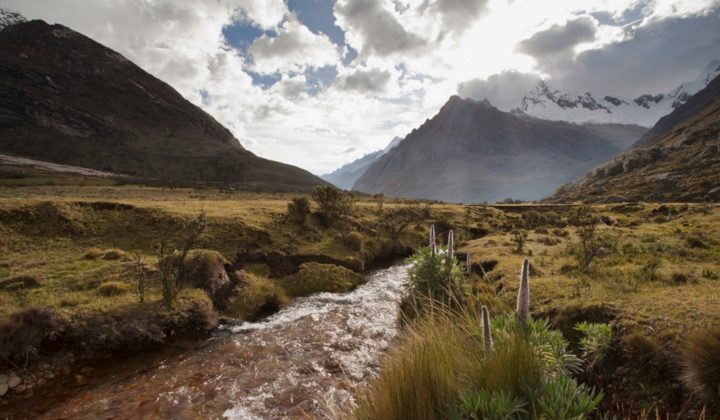
Lead

My main research interest is to understand the distribution of life on earth (e.g. species, biodiversity, vegetation types, ecosystems) through space and time. I am particularly interested in interactions between climate and the terrestrial biosphere. This includes potential impacts of climate change on species, ecosystems and associated ecosystem services, as well as the role of the biosphere in the earth climate system (e.g. carbon and water cycling). Methodologically, vegetation and ecosystem modelling at local to global scales has been at the core of my work.
Examples of current projects:
- GEOEssential
- EarthShape: Earth Surface Shaping by Biota
- Ecosystem Management Support for Climate Change in Southern Africa (EMSAfrica)
- The open Climate Impacts Encyclopedia (ISIpedia)
- Past warm periods as natural analogues of our “high CO2” climate future (VeWA Project)
- Environmental changes in biodiversity hotspot ecosystems of South Ecuador: RESPonse and feedback effECTs (FOR2730)
- Fire in the Future: Interactions with Ecosystems and Society – FURNACES
- Multisectoral analysis of climate and land use change impacts on pollinators, plant diversity and crops yields – MAPPY
- BioDiv-Support: Scenario-based decision support for policy planning and adaptation to future changes in biodiversity and ecosystem services
Examples of environmental impact assessments:
- IPBES-IPCC Co-Sponsored Workshop Report on Biodiversity and Climate Change
- Global Assessment Report on Biodiversity and Ecosystem Services (Chapter 5)
- IPBES Scenarios and Models Assessment
- North Sea Region Climate Change Assessment (NOSCCA, chapter Terrestrial Ecosystems)
BSc. and MSc. topics (‘Abschlussarbeiten’)
For international publications and peer-reviewed published papers, see my profile on Google Scholar or my Web of Science Researcher ID S-6287-2016
For further publications, e.g. IPBES assessments, see Further publications (pdf)

Research interests
• Metadata applications describing biological/biodiversity data
• Integrative models using this data
• High-performance computing in context of computational biology
Short CV
2005 – 2010 Software developer, Senckenberg Library & HRZ Goethe University
2004 Dr.phil.nat, J.W.Goethe University Frankfurt
1998 – 2002 Research Assistant at Dept. Of Cell Biology & Neu-roscience JWG
1997 Diploma in Biology, J.W.Goethe University Frankfurt
Selected Publications
Weiland, C. Über Zeitverarbeitung in der MSO. Modellierung der neuronalen Prozesse in der Medialen Superioren Olive. PhD thesis Johann Wolfgang Goethe University, Frankfurt 2004
Weiland, C. A Multi-Threaded Solver for Auditory Computations in the MSO. Proceedings of the First Congress of Alps Adria Acoustics Association, pp. 607-610, Portoroz 2003.
Weiland, C. A Network Model for the Functional Architecture of the Mammalian Medial Superior Olivary Nucleus. J. Acoust. Soc. Am. 105, 1999.

Research interests
Fascinated by diversity and dynamics of life on Earth, my current work mainly focuses on spatiotemporal predictive distribution models, application of earth observation in biodiversity and ecosystem studies, and open geo-information tools for to support science-policy interactions. I am interested to understand global patterns of life and the associated underlying drivers. I, therefore, extensively develop spatio-temporal models and improve their performance and reliability in particular applications.
Main Projects
IPBES, Intergovernmental Science-Policy Platform on Biodiversity and Ecosystem Services, is an independent intergovernmental body, established by member States in 2012. It provides policymakers with objective scientific assessments about the state of knowledge regarding the planet’s biodiversity, ecosystems and the benefits they provide to people, as well as the tools and methods to protect and sustainably use these vital natural assets. IPBES mission is to strengthen knowledge foundations for better policy through science, for the conservation and sustainable use of biodiversity, long-term human well-being and sustainable development. For more information visit www.ipbes.net
GEOEssential, Variables Workflows for Resource Efficiency and Environmental Management, is one of the four ERA-Planet projects, supported by the EU Horizon 2020 Programme. GEOEssential aims to strengthen the European Research Area by evaluating existing structures and platforms, and by providing new applications in the field of Earth Observation (EO) to monitor the progresses in environmental conditions towards policy targets. It will create cross-thematic workflows to evaluate, predict and monitor natural resources with Earth Observation tools, in particular in relation to the UN Sustainable Development Goals (SDGs), IPBES, and the Convention on Biological Diversity (CBD). Our institute leads the biodiversity and ecosystem functioning work package. In close collaboration with other institutes, this work package will map the relevant data landscape and institutions, develop specific workflows for indicators, evaluate the application of EO products to inform dynamic models, review the exiting policy and reporting needs, and finally transfer the annotated processing services and workflows for biodiversity and ecosystem functioning and services to the GEOEssential project dashboard. For more information visit www.geoessential.eu
External Links
List of my publications on Google Scholar
Follow me on Twitter @AidinNiamir


Associated staff

Biodiversity Information Coordinator (Marine Zoology, SGN Frankfurt)
Data Manager Ocean Biogeographic Information System (OBIS), Deep Sea Node, UNESCO
Chair Data Quality Control Task Team, OBIS
Research interests
I am interested in understanding the driving factors (ecological and evolutionary process) which shape the biodiversity patterns and biogeography in marine species (shallow and deep sea) using big data. In addition, I am interested in predicting how these biodiversity patterns and species distribution ranges will shift under future climate change. I am also the OBIS (Ocean Biogeographic Information System) deep-sea node data manager in UNESCO, specialised in managing big datasets, biodiversity data standards, and quality control tasks. To carry out my research, I use different skillsets and apply different methods and techniques such as taxonomy (morphology and molecular), phylogeny, biogeography, big-data management, biodiversity informatics, macroecology, and species distribution modeling and ecological modeling.
At the moment, I am leading projects in digitisation of museum collections, biogeography, biodiversity informatics using big-data at the regional (e.g. NW Pacific) and global scales. I also work for science-policy intergovernmental bodies such as IPBES (Intergovernmental Science-Policy Platform on Biodiversity and Ecosystem Services) to provide fundamental information for biodiversity assessment reports in a response to policy makers to better understand the global status of biodiversity in the World Oceans and consequently to establish more efficient strategic management plans to maintain the Ocean Biodiversity.
Current research projects
- Biogeography of the NW Pacific deep-sea fauna and their possible future invasions into the Arctic Ocean (Beneficial Project)
- Estimating the global future shift patterns of shallow-water and deep-sea Crustacea
- Biodiversity and biogeography of molluscs along the NW Pacific and the Arctic Ocean
- Biodiversity and future distributions of corals along the NW Pacific and the Arctic Ocean
- Biogeography of marine species richness and impact of climate change
- IPBES thematic assessment of invasive alien species and their control
Student opportunities
Various research projects for postdocs, PhDs, MSc and BSc students as well as for short internships are available this year and all year round. These opportunities are mostly in the field of biogeography, ecology, biodiversity informatics, and ecological modeling. Further Postdoc and PhD projects can also be discussed and jointly developed. Please contact me for more details.
Teaching
I have more than 15 years of international experience in teaching and supervising students from high school to MSc. Programs.
Selected publications
Saeedi, H., Simoes, M., Brandt, A. (2020). Biodiversity and distribution patterns of deep-sea fauna along the temperate NW Pacific. Progress in Oceanography, 183: 102296. https://doi.org/10.1016/j.pocean.2020.102296.
Saeedi, H., Simoes, M., Brandt, A. (2019). Endemicity and community composition of marine species along the NW Pacific and the adjacent Arctic Ocean. Progress in Oceanography. Progress in Oceanography, 178: 102199. https://doi.org/10.1016/j.pocean.2019.102199.
Saeedi, H., Costello, M. J., Warren, D., Brandt, A. (2019). Latitudinal and bathymetrical species richness patterns in the NW Pacific and adjacent Arctic Ocean. Scientific Reports, 9:9303. https://doi.org/10.1038/s41598-019-45813-9.
Saeedi, H., Reimer, D. J., Brandt, J. M., Dumais, P. O., Jażdżewska, M. A., Jeffery, W. N., Thielen, M. P. (2019). Global marine biodiversity and prediction in the context of achieving the Aichi Targets: ways forward and addressing data gaps. Peerj, 7: e7221. https://doi.org/10.7717/peerj.7221.
Saeedi, H., Bernardino A. F., Shimabukuro M., Falchetto G., & Sumida P. Y. G (2019). Macrofaunal community structure and biodiversity patterns based on a wood-fall experiment in the deep South-west Atlantic. Deep Sea Research Part I: Oceanographic Research Papers, 145:73-82.
Saeedi, H. & Costello M. J. (2019). A world dataset on the geographic distributions of Solenidae razor clams (Mollusca: Bivalvia). Biodiversity Data Journal, 7:e31375. https://doi.org/10.3897/BDJ.7.e31375.
Saeedi, H., Kamrani, E., Shayesteh, F., Nordhaus, I., Diele, K., Raeisi, H. (2018). Sediment Temperature Impact on Population Structure and Dynamics of the Crab Austruca iranica Pretzmann, 1971 (Crustacea: Ocypodidae) in Subtropical Mangroves of the Persian Gulf. Wetlands, 38(3): 539–549.
Saeedi, H., Costello, M. J. and Dennis, T. (2017). Modelling present and future global distributions of razor clams (Bivalvia: Solenidae). Helgoland Marine Research, 70: 23.
Chaudhary, C., Saeedi, H., & Costello, M. J. (2017). Marine species richness is bimodal with latitude. Trends in Ecology and Evolution. 32(4): P234-237.
Saeedi, H., Costello, M. J. and Dennis, T. (2016). Bimodal latitudinal species richness and high endemicity in razor clams (Mollusca: Bivalvia). Journal of Biogeography. 44(3): 592–604.
Chaudhary, C., Saeedi, H., & Costello, M. J. (2016). Bimodality of latitudinal gradients in marine species richness. Trends in Ecology and Evolution, 3(9): 670-676.
M.Sc.
Responsibilities: GFBio Data Center
04/2018-11/2021 GFBio
12/2021 Scientific Data Curator SGN

Research interests
I am interested in processes and their driving forces underlying past and present patterns of species distribution and diversity. My research has focused predominantly on the phylogeography of tarsiers, small nocturnal primates endemic to Southeast Asia. For this purpose, I conducted comprehensive field studies and phylogenetic analyses. Currently I am working in the infrastructure project BIOfid, a specialised information service for biodiversity research. This collaborative project between Senckenberg, the Text Technology Lab of the Goethe University Frankfurt and the J. C. Senckenberg University Library in Frankfurt aims to mobilise biodiversity data from legacy and contemporary scientific literature. My main task is the structured compilation and linking of biological, environmental and meta-information to support the development of new text mining tools for ontology-based semantic search in the BIOfid portal.
External links
My ResearchGate Profile
Visit BIOfid at ResearchGate
BIOfid homepage
CV [PDF]
Publications
Full list of publications on Google Scholar




